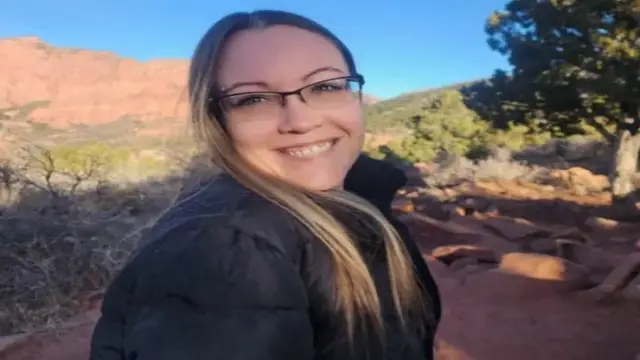It was approved by the broadcaster’s board of directors that a series of hour-long specials under the same name would be introduced in the wake of editorial failures.
Maryanne Demasi, host of Catalyst, has been placed on administrative leave after an investigation into her Wi-Fried? show, which was determined to have violated the ABC’s impartiality requirements. The program’s 11 staff members have been fired by the broadcaster’s board of directors. A picture of ABC
A bold strategy by the ABC board has resulted in Catalyst losing its weekly schedule and laying off 11 staff members, including suspended presenter Maryanne Demasi.
There are 17 one-hour scientific specials planned to replace the current programme, which has an in-house magazine format.
Nevertheless, top ABC programmers have cautioned that if the weekly half-hour show and the scientific unit are abolished, the quality of science programming would be lowered and Australian science on television will be virtually wiped out.
Wi-Fried?, a show that connected Wi-Fi and mobile phones to health dangers such as brain cancer, was determined to have violated ABC impartiality requirements and Demasi has been placed on leave.
This was the second Catalyst article written by Demasi to be discovered in violation of ABC editorial regulations and deleted off the website. In spite of an editorial lapse on a statins programme in 2013, Demasi was able to keep her employment.
As a result of the Demasi security vulnerabilities, an internal management investigation has suggested that the whole weekly show, together with its presenters, producers, and researchers, be ceased operations altogether.
In the words of senior programmers and independent producers, middle management at Catalyst has “absolved itself” of any responsibility for the absence of editorial control that resulted in the clearance of the two shows for transmission.
Short-form news-related material is a natural fit for Catalyst’s hour-long documentaries since science lends itself to it, ABC programme programmers believe. Australian elements would be much diminished in the extended format, they claim.
According to one senior ABC programme creator, “by doing this you are suggesting the ABC TV ceases reporting science adequately.” Seventeen in-depth reports a year aren’t enough to cover the science in Australia. There will be no science coverage if you cease reporting on short-form scientific journalism. Only a small percentage of science fiction storylines can make it through an hour of prime time television. There are just a few of subjects like that out there. Many of these projects need an international perspective rather than a local one in order to be completed successfully.
Among Catalyst’s employees are veteran ABC scientific reporters Graham Phillips and Jonica Newby, both of whom have received Australia’s most prestigious science journalism award, the Australian Museum Eureka medal, twice.
TV management, comprising director Richard Finlayson and factual head Steve Bibb, recommended the idea to shake up ABC scientific coverage, based on the BBC’s Horizon format, to the board.
ABC executive Brendan Dahill wrote the Catalyst review before he departed to become CEO of Keogh Films, which produces Struggle Street.
On the ABC’s very limited budget, one independent producer told Guardian Australia, the proposal was untenable. When asked why she thought 17 one-hour scientific specials would never work, she said, “I don’t know.”
This is a ‘light’ audience, she said, and they don’t want anything heavy.
It was found that “the cumulative effect of the inadequate signage for the audience; the selection and lack of context in scientific papers referenced in or supporting the programme; the prominence of views challenging the scientific consensus; and the findings for accuracy all unduly favour” the unorthodox perspective that wireless devices and Wi-Fi pose significant health risks. The independent report on Wi-Fried?
Catalyst is now being reviewed, according to an ABC representative. This year, Catalyst will be on the ABC schedule, and the network recognises the program’s value to both the scientific community and its viewers, ABC Deputy Director of Communications and External Affairs, Mark Thompson, stated.
Programs are constantly reviewed at year-end to ensure that they meet the requirements and expectations of the ABC’s audience. ABC Television is re-evaluating the concept and production strategy of Catalyst after more than 15 years. In the future, ABC management will reply to the evaluation.
The Community and Public Sector Union (CPSU), the ABC’s employee union, said it was critical that the ABC retain its focus on science and technology programming from inside Australia.
ABC section secretary Sinddy Ealy said the CPSU has written to ABC asking an immediate confirmation that the alleged dismantling of Catalyst in its present form is genuine. That’s a horrible manner for employees to learn that they may be fired. ” As Catalyst serves a critical role in Australian science reporting, we are concerned that a longer-format successor might exclude crucial and interesting scientific developments. ABC’s approach to deliberately dumb down expert information in order to boost ratings would be a terrible disservice to the Australian people.
“The shifting media environment means that ABC’s specialised programming is more important than ever before. In addition to frequent programme reviews, ABC must make certain that the quality expert content and the employees that support it are kept.


















